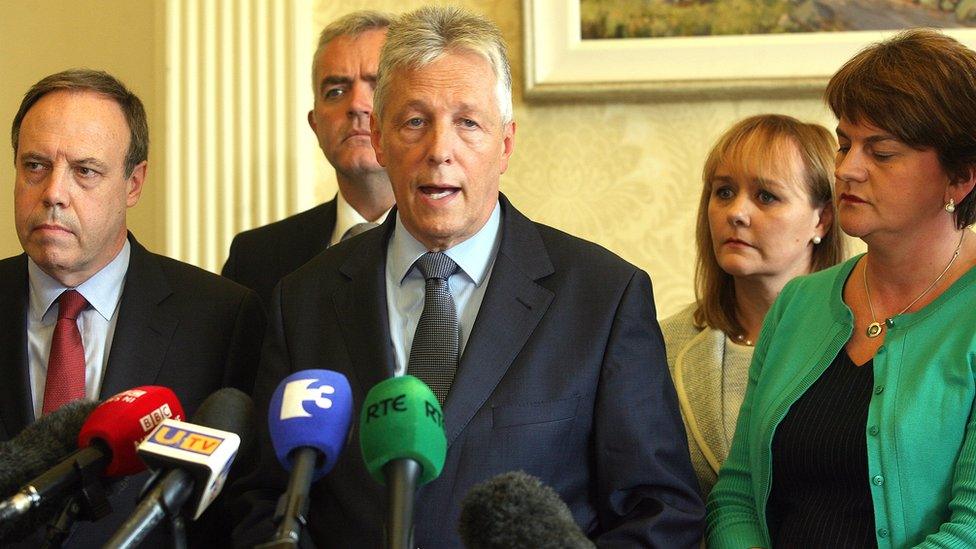Cunning plans or historic deals: what next for Stormont?
- Published
- comments

Martin McGuinness said there was six weeks to save the political process; Gerry Adams reckoned it could take a little longer
"For the rest of our lives," Gerry Adams joked when asked how long he expected the latest round of Stormont House talks to go on.
"Four weeks," Martin McGuinness, standing next to him, clarified.
That was before Sinn Féin's northern chair was arrested then released by detectives investigating the murder of Kevin McGuigan Sr.
It was also before the SDLP resisted pressure to adjourn the assembly and before the DUP's ministerial team resigned or stood aside, with the notable exception of Finance Minister and now Acting First Minister Arlene Foster.
All of which was pretty dramatic, but by the end of the week Martin McGuinness reckoned we had six weeks to save the process, which by my calculation was an extra fortnight.
Cunning
Under the Northern Ireland Act, Mrs Foster can only occupy her 'acting' role for a continuous period of no more than six weeks.

The DUP could have a 'cunning plan' or two ready to put into action, but for how long will the public put up with game-playing?
But a senior DUP source pointed out that a five-minute return to office by Peter Robinson could interrupt such a "continuous" period, enabling Mrs Foster to step back into the breach on repeated occasions.
That's not the only area where we will have to be alert for Baldrick-style 'cunning plans'.
Peter Robinson told me on Inside Politics he has no intention of letting Sinn Féin and SDLP ministers take over the health, enterprise and social development departments his colleagues have just vacated.
Presumably the plan would be to nominate DUP politicians to take over the vacant departments within the seven-day timescale set by the rules, then have them step down again almost immediately.
Impacts
All this procedural game-playing will be in parallel with renewed Stormont House talks.
It seems unlikely the tactical manoeuvring will last as long as six weeks, not least because the public might regard it as too clever by half.

The parties know they will be throwing themselves at the mercy of the voters sooner or later
On BBC Newsline I pointed out that the absence of a regional development minister already meant that some common sense measures, like speed restrictions near rural primary schools, were not getting rubber-stamped.
One can imagine similar practical negative impacts if there are no ministers in charge of health or housing for extended periods.
With David Cameron still appearing to rule suspension out, the parties remain well aware that sooner or later over the next eight months they are likely to be throwing themselves at the mercy of the voters.
Maybe by then we will have another 'historic' deal covering welfare reform, the budget, corporation tax, paramilitary activity, parades, the past and the weakness of the current Stormont system.
But right now it looks more likely that these will be the topics the politicians will still be arguing about when the voters go to the polls.